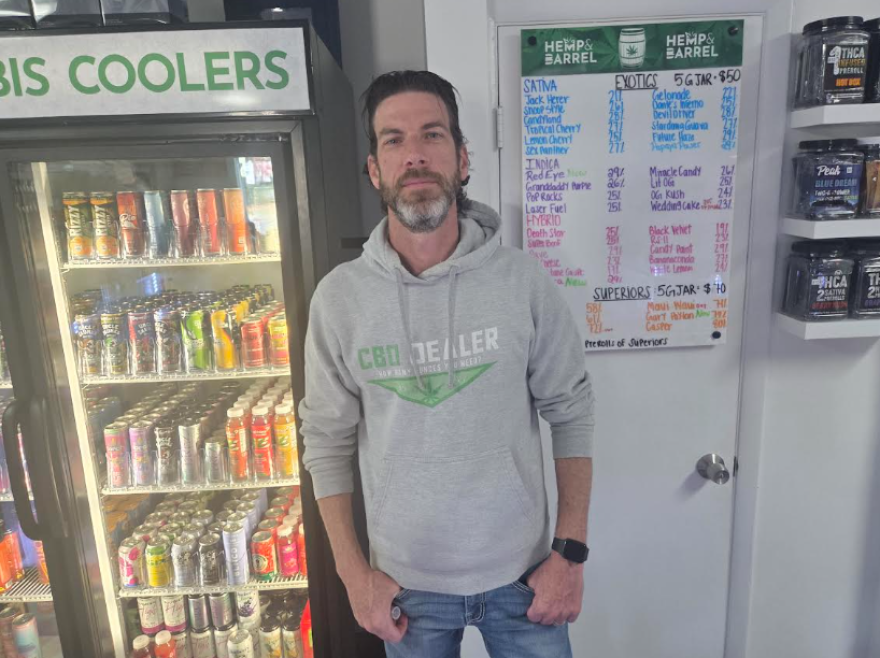The U.S. Senate’s continuing resolution to end the federal government shutdown has a surprising provision that's not related to government spending, health care subsidies, or other hot-button issues: a near-prohibition on all hemp-derived products, such as THC-infused drinks and cigarettes.
That could spell the end for North Carolina’s booming businesses that sell the intoxicating products.
Over the past five years, stores selling hemp-derived products have flourished, selling products like smokable THC-A flower, gummies, candy and drinks infused with THC. Some businesses have billboards along interstates.
The products contain Delta-8 and THC-A, which are close derivatives of Delta-9 THC, the chemical in marijuana that gets you high.
Matt Mitchell, owner of Hemp and Barrel in Pineville, has a wide array of products on display.
“This will be all our flowers,” he said, pointing to plants kept behind a glass case. On the wall, the store has a board showing the percentage of THC-A contained in each product. When eaten, THC-A has no effect. But when burned, it converts to regular Delta 9 THC, and has the same effects you would get from smoking pot. The cigarettes produce a high just like a joint — and it's legal.
Mitchell continues the tour.
“Here’s your CBD, your concentrates,” he said. “Pet stuff over here. Tea. Topicals. Edibles. Chocolate. Gummies.”
Mitchell has been in business for six years, but the upcoming year could be his last.
The Senate continuing resolution that funds the government would also revamp the 2018 Farm Bill. One provision in that earlier law allowed for a proliferation of hemp-derived products that are being sold in places where marijuana is still illegal, like North Carolina, Texas, Georgia and Wisconsin.
The new restrictions would take effect in a year, severely limiting the amount of THC-like chemicals in products and effectively outlawing the dried plants, edibles and other items in his shop.
“It would shut everything down,” he said. “There’s just no way to get [my products] to that level. It just wouldn’t be beneficial.”
Phil Dixon with the UNC School of Government is an expert on North Carolina’s hemp industry, which he has called the “Wild West.” The General Assembly has debated bills to regulate the market, but hasn’t approved any.
Now, Congress could be doing their work for them, Dixon said.
“It would be a big change on the federal definition of hemp and it would vastly constrict the industry if not effectively shutting it down altogether,” he said.
That wouldn’t just affect the THC-selling stores such as CannaBuddy, Blue Flowers and Apotheca that have become ubiquitous. It also would mean pulling products from stores big and small, from gas stations to major retailers like Total Wine that sell THC-infused drinks.
The Trump administration has said it approves of the new regulations.
On Monday, Sen. Rand Paul, a Kentucky Republican, pleaded unsuccessfully with his colleagues to remove the provision. Kentucky is a large hemp-producing state.
“Instead of a clean CR, this bill contains language that has been air-dropped that will destroy hemp farming and the United States,” he said on the Senate floor.
Paul’s amendment to remove the hemp provisions was defeated on a 76-24 vote, according to Politico. Republican Sen. Ted Cruz of Texas joined Paul as the only Republicans to back it. Twenty-two Democrats also support the amendment.







